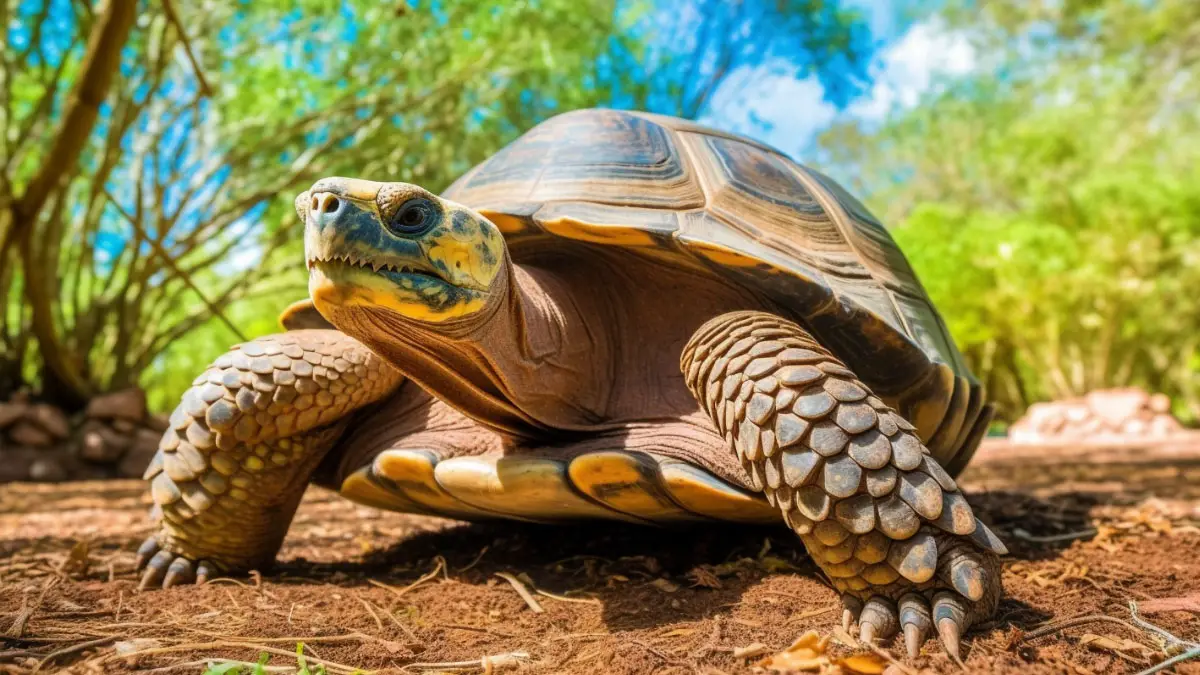What To Feed A Desert Tortoise? – A Complete Guide
Desert tortoises are vulnerable to many foods that can cause them severe health issues. Thus, if you own this tortoise as a pet, you must know which foods are suitable for it and which are not.
So, what to feed a desert tortoise? You can feed it grass, green leaves, and vegetables. Alongside, please treat them with occasional foods like edible flowers and fruits, mixed salad, and calcium supplements. Ensure you are not feeding them animal protein, calcium oxalate, and sodium-rich foods.
Through this article, we will enlighten you about what you should feed your tortoise regularly and occasionally. You will also learn those things that you need to consider while feeding them. Thus, keep reading.
Daily Nutritional Need for A Desert Tortoise
Contents
Here is a list of nutritional requirements of a desert tortoise:
- Carbohydrate:55-75%
- Native Grass and forbs: 80-85%
- Vegetables: 15-20%
- Protein:15-35%(No additional protein)
- Water: Minimum once a week
- Calcium-phosphorus ratio: 1:1-2:1(1-2 times a week)
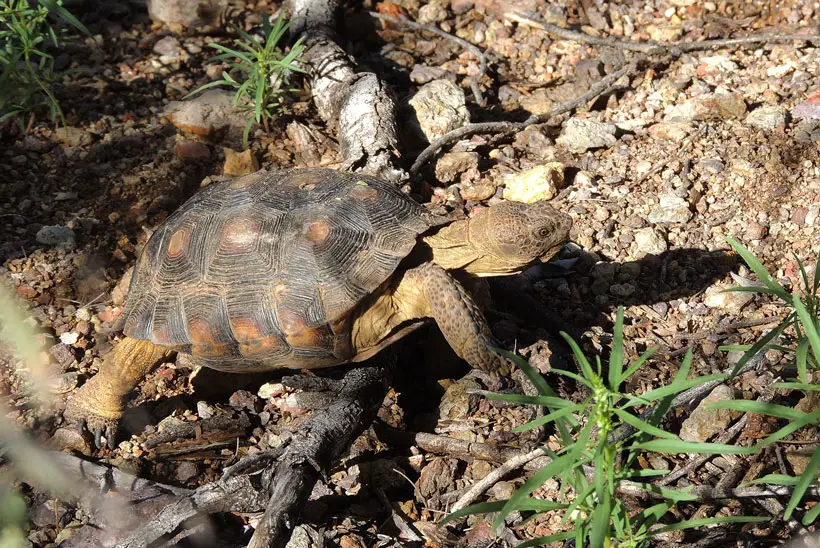
What To Feed A Desert Tortoise?
Generally, these tortoise species are herbivores and depend on native grasses, leafy greens, weeds, and hays. Also, a small portion of their diet contains fruits and hard vegetables for food.
Usually, 85% of their diet will contain native grass, forbs plants, leafy greens, etc. Then, the rest will consist of vegetables. Generally, forbs are more nutritious and mineral-rich than grasses for juvenile desert tortoises.
We are not mentioning fruits here as you should treat them with fruits occasionally rather than including them in their daily diet.
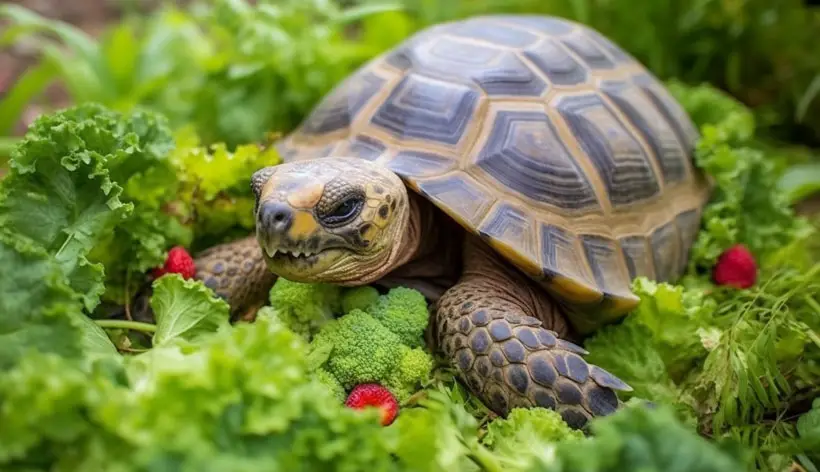
Here are some names of plants and vegetables that they can eat:
Grasses, And Weeds
Some grasses and weeds that they can eat:
- Rice grass
- Rye grass
- Nutgrass
- Bermuda grass
- Clover hay
- Mallow
Leafy Greens
You shouldn’t keep more than 50% of these leafy greens in this tortoise forage. Here are those appropriate leafy greens:
- Turnip greens
- Spinach
- Collard
- Dandelion flowers and green
- Parsley
- Mustard Green
- Kale
- Grape leaves
- Mulberry tree leaves
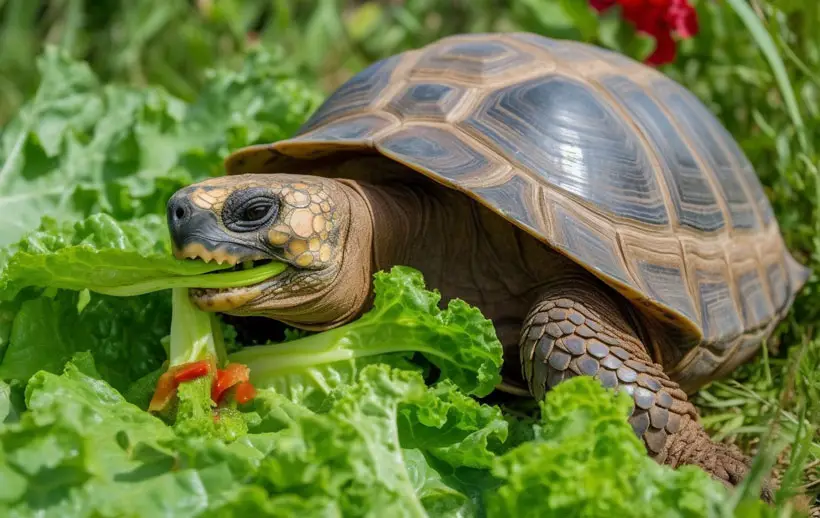
Vegetables
15-20% of the regular diet of this tortoise will consist of these vegetables:
- Broccoli
- Acorn squash
- Butternut squash
- Turnip
- Sweet potatoes
- Green beans
- Lentil
- Carrots
- Pumpkins
- Cooked or plain potatoes
Cactus
Cactus is one of those natural foods that this tortoise species feeds on in the wild. Thus, you can serve your pet cactus by removing the thorns carefully. Generally, cactus will fulfill the tortoise’s fiber, calcium, Vit-C, and water requirements.
Water
You should provide them with a large but shallow water dish. Make sure you are keeping this water dish in the shade. Additionally, you can also try soaking your tortoise in warm water once or twice a week for 15-20 minutes.
This will also help them to void their urine bladder, which will reduce the potential risk of bladder stones.
You can check this Youtube video for further information about the diet habit of desert tortoises:
The Supplementary Food Options For Your Desert Tortoise
If you can’t ensure the supply of adequate natural foods, you can provide them with some supplements.
Fruits And Flowers
Here are some fruits and flowers that you can serve your pet occasionally
- Hibiscus flower
- Rose petals
- Escarole
- Endive
- Corn
- Cucumber
- Zucchini
- Apples
- Berries
- Apricots
- Bananas
- Grapes
- Oranges
- Papaya
- Peach
- Tomatoes, etc.
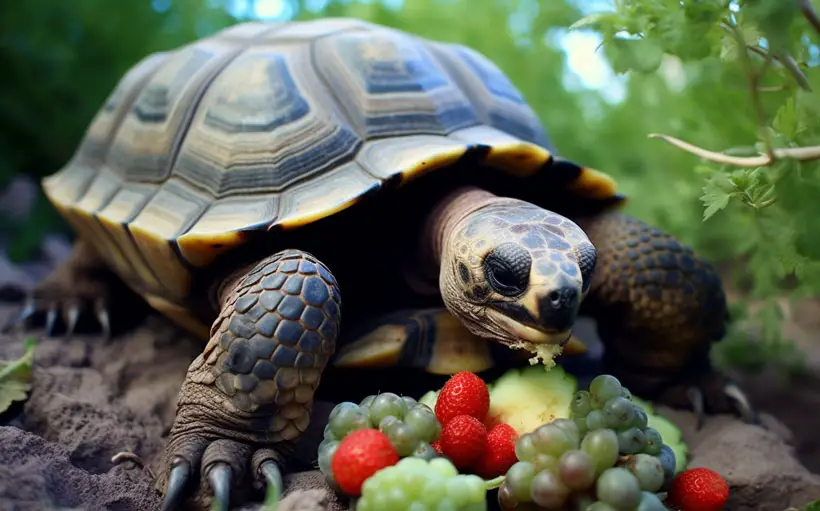
Calcium Supplements
To fulfill the calcium requirements of your tortoise, you can sprinkle calcium carbonate on their food occasionally. Instead, you can feed them cuttlefish bone or boiled eggshells of chicken.
Young, housed, or those tortoises that are in the growth stage are primarily in need of these calcium supplements. Make sure you are providing them with these supplements 1-2 times a week.
Mix Salad
You can also make the salad by mixing multiple vegetables and fruits and serving the salad to your pet. These types of salads are suitable for raising the appetite of your tortoise. You can also add a little amount of thiamine to their salad.
Considerations While Feeding Your Desert Tortoise
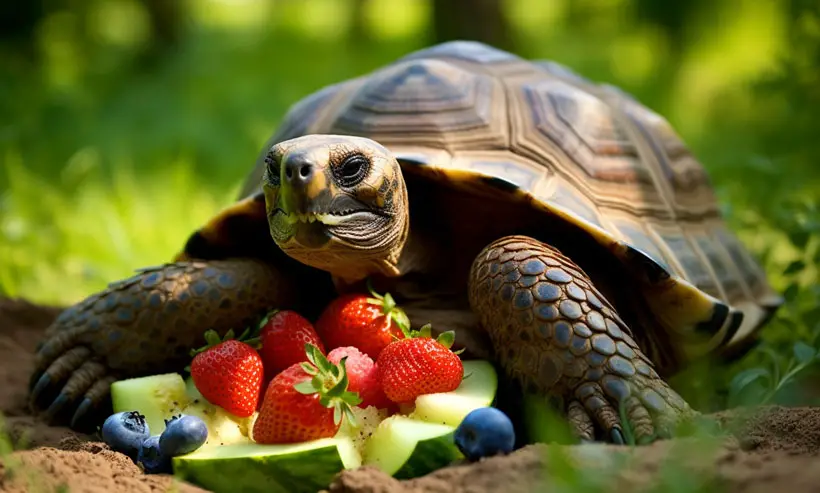
The food requirements of your tortoise may change with age, or some foods can be risky for them. Thus, while feeding them, keep the following suggestions in your mind:
- Please don’t feed your pet tortoise excessive supplementary or occasional food, as it can cause kidney failure or diarrhea. Feeding those food items once a week will be enough.
- It’s better to feed them foods that consist of calcium oxalate, like parsley, spinach, etc. Otherwise, your tortoise may face metabolic bone disease and mineralization of the internal organs with soft tissues.
- Foods like cabbage, kale, and broccoli consist of high goitrogens. Feeding these foods to your tortoise excessively may impact their thyroid function.
- Also, never feed your tortoise any animal protein, soy, tofu, etc.
- Avoid feeding the tortoise hatchlings bananas, tomatoes, and oranges.
- Always remove pits and seeds from food before feeding your pet, as these can choke your pet.
- To avoid choking your tortoise, you can cut large fruits into tiny pieces according to the bite size of your pet.
- You shouldn’t feed your tortoise frozen food and also canned vegetables. The canned vegetables can contain high amounts of sodium, which is not suitable for your desert tortoise.
- If you feed your tortoise those foods that are low in nutrition, it will fill their stomach but won’t meet their nutritional requirements.
- Excessive protein intake may cause shell deformation and kidney or liver damage.
FAQs
In this FAQs section, we will answer several common questions about the desert tortoise.
Yes. There are records of this tortoise eating the feces of rabbits, lizards, woodrats, or other herbivore animals. This will add several vital and helpful gut microbes and nutrients to its diet.
Your pet tortoise can refuse to eat suddenly due to inadequate lighting and heat. Also, sickness or excessive supplementary food may make them uninterested in eating.
When your tortoise refuses to eat, try to hand feed them and provide specific lighting and temperature conditions to reduce their lethargy. If nothing works, consult any veterinarian and provide treatment according to the prescription.
Conclusion
As a pet owner of a desert tortoise, you must be careful about which food is poisonous for your tortoise. For your convenience, we have already provided lists of what to feed a desert tortoise. Typically, you need to offer them food with lower protein and higher fiber content.
Alongside, please provide them with fruits, edible flowers, and calcium supplements occasionally. Besides, avoid feeding or feeding less foods with high calcium oxalate and goitrogens. Also, you must be careful about the pits and seeds of fruits that can choke your tortoise.

